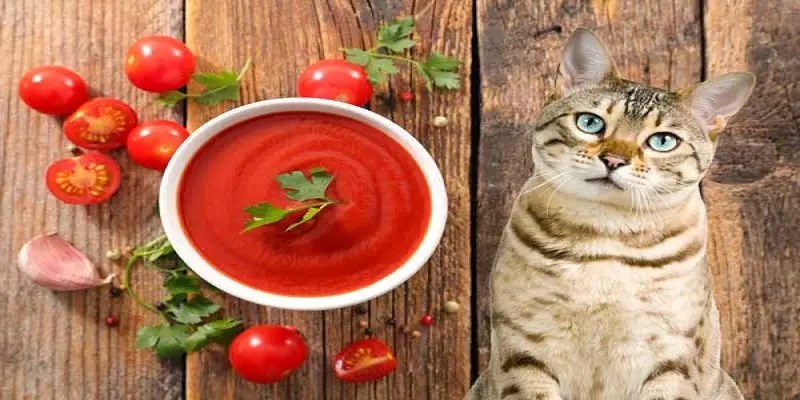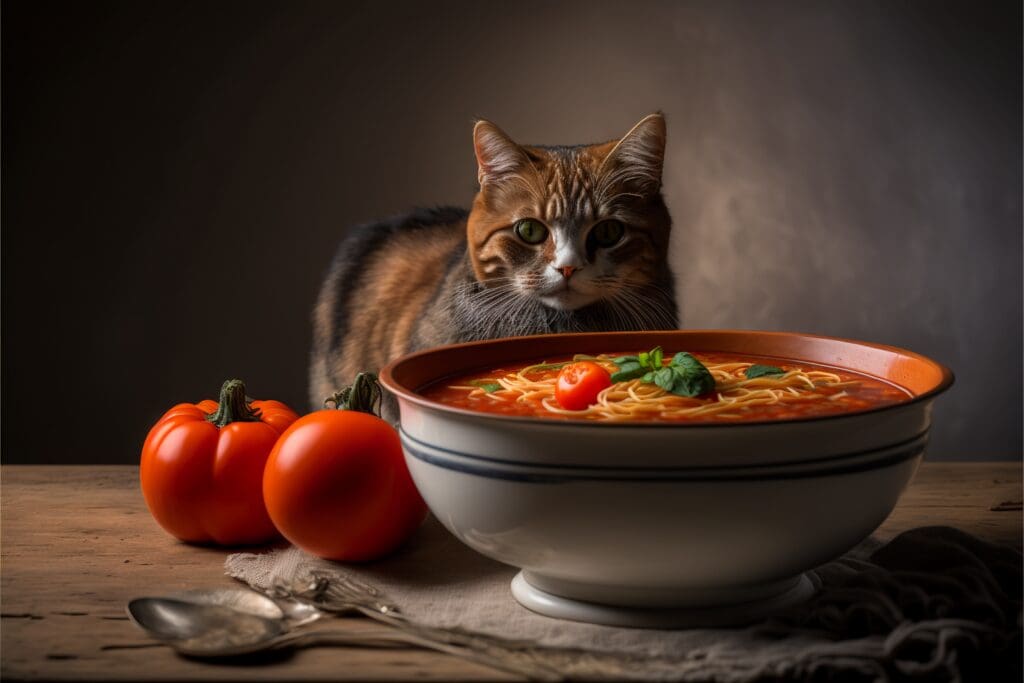Cats are known for their selective eating habits, and as a responsible pet owner, it’s essential to ensure that the food you offer them is safe and healthy. Tomato soup is a popular dish enjoyed by many, but can cats eat tomato soup? In this article, we will explore whether tomato soup is suitable for feline consumption and discuss any potential risks or benefits associated with it.

Can Cats Safely Consume Tomato Soup?
While cats are obligate carnivores and primarily require a diet rich in animal protein, they can occasionally consume small amounts of certain fruits and vegetables. However, when it comes to tomato soup, caution is advised. Tomato soup often contains ingredients like onions, garlic, and spices, which can be harmful to cats. Additionally, the high sodium content in canned tomato soup can also pose health risks for felines.
The Dangers of Onions and Garlic
Onions and garlic belong to the Allium family and contain compounds that can cause damage to a cat’s red blood cells, leading to a condition called hemolytic anemia. Even small amounts of onion or garlic can be toxic to cats and may result in symptoms such as weakness, vomiting, and pale gums. Therefore, it is crucial to avoid feeding tomato soup that contains these ingredients to your feline companion.
Sodium Content in Tomato Soup
Cats have a low tolerance for sodium, and excessive consumption can lead to various health issues, including dehydration, kidney problems, and high blood pressure. Canned tomato soup often contains high levels of sodium as a preservative and flavor enhancer. Feeding tomato soup to your cat regularly can put them at risk of developing these health complications.
Potential Benefits of Tomatoes for Cats
While tomato soup may not be suitable for cats, tomatoes themselves can offer some nutritional benefits when given in moderation. Tomatoes are a good source of vitamins A and C, as well as antioxidants. However, it’s important to note that cats cannot efficiently process plant-based nutrients, and their bodies are designed to obtain essential nutrients from animal sources.
Alternatives to Tomato Soup for Cats
If you’re looking to offer your cat a treat or a special meal, there are safer alternatives to tomato soup. Cooked, unseasoned chicken or fish can be a healthy and enjoyable option for your feline friend. Always ensure that the meat is boneless and thoroughly cooked to avoid any potential health risks.
Conclusion
In conclusion, cats should not be fed tomato soup due to the potential dangers associated with its ingredients and high sodium content. While tomatoes themselves can offer some nutritional benefits, it’s best to consult with your veterinarian before introducing any new food into your cat’s diet. Remember, the health and well-being of your furry companion should always be a top priority.
FAQs
1. Can cats eat raw tomatoes?
Raw tomatoes are generally safe for cats to consume in small amounts. However, it’s important to remove the stem and any green parts, as they can be toxic. Always introduce new foods gradually and monitor your cat for any adverse reactions.
2. Are there any other human foods that cats should avoid?
Yes, there are several human foods that can be toxic to cats. Some common examples include chocolate, caffeine, grapes, raisins, alcohol, and certain artificial sweeteners like xylitol. It’s best to stick to a balanced and species-appropriate diet for your feline companion.
3. Can cats have tomato sauce?
Tomato sauce often contains additional ingredients like onions, garlic, and spices, which can be harmful to cats. It’s best to avoid feeding tomato sauce to your cat and opt for safer alternatives that are specifically formulated for feline consumption.
4. How can I ensure my cat’s diet is balanced and nutritious?
Consulting with a veterinarian is crucial to ensure your cat’s diet meets their nutritional needs. They can provide guidance on selecting high-quality commercial cat food or creating a balanced homemade diet. It’s important to consider factors such as age, weight, and any specific health conditions your cat may have.
5. What should I do if my cat accidentally consumes something toxic?
If you suspect your cat has ingested something toxic, it’s important to seek immediate veterinary care. Contact your veterinarian or a pet poison helpline for guidance. Do not induce vomiting or administer any home remedies without professional advice, as they may do more harm than good.

